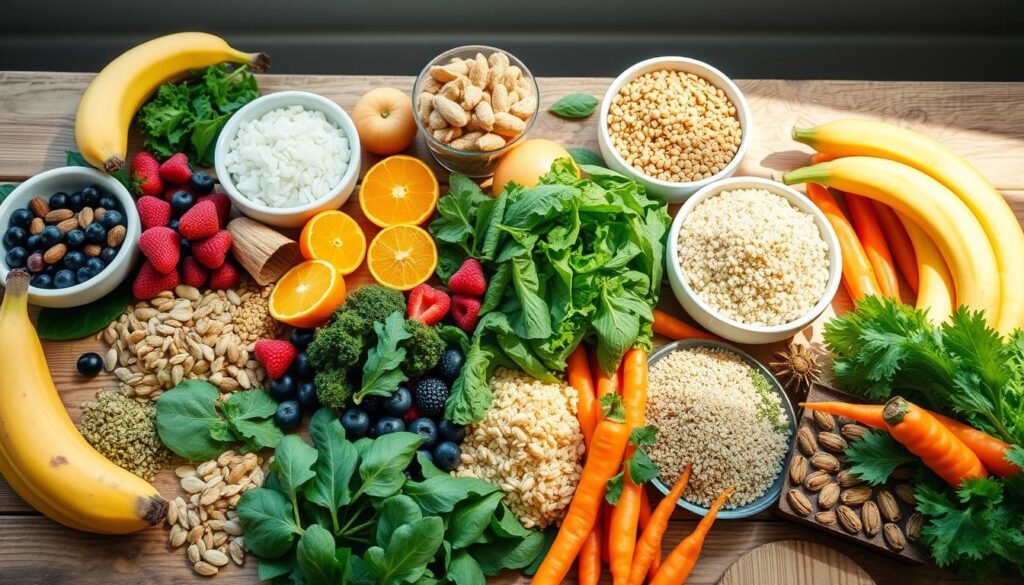About 40 percent of people on SSRIs like Zoloft report side effects, many say they’re very bothersome. Zoloft, known for treating mental health issues, often leads to decreased energy and fatigue. It’s key to know how it affects your energy.
Changing your diet can make a big difference in handling Zoloft fatigue. The right foods can boost energy and improve mood. By looking into dietary tips to fight Zoloft fatigue, you can better manage your health. This natural approach to health is empowering.
Learning about nutrition helps manage Zoloft fatigue better. This article offers tips and strategies to reduce Zoloft fatigue. Follow these for a more vibrant life.
Key Takeaways
- Zoloft can cause fatigue in nearly 40% of users, making dietary intervention crucial.
- Nutrition plays a key role in managing Zoloft-related symptoms.
- Incorporating nutrient-dense foods can enhance energy levels.
- Balancing macro-nutrients is essential for optimal health.
- Staying hydrated significantly affects energy levels.
- Regular meal timing can help maintain consistent energy throughout the day.
- Consulting healthcare professionals can provide tailored nutritional guidance.
Understanding Zoloft Fatigue
Zoloft fatigue is a common issue for people starting or changing their dose of sertraline. Many feel tired or have low energy. This can greatly affect their day-to-day life. The main reason for this fatigue is how serotonin levels are changed by the medicine. About 10% of people taking sertraline might feel sleepy, adding to this tiredness.
To understand antidepressant fatigue, it’s key to know how brain chemicals balance. Sertraline boosts serotonin but may also lower alertness and desire to do things. It might take five to seven days to remove sertraline from the system when changing medicines. This can also affect energy levels for a while.
Zoloft fatigue can get worse because of ongoing depression or how one lives their life. So, talking often with doctors is very important. Watching out for Zoloft’s side effects is crucial. If the tiredness doesn’t go away, some might stop treatment, especially if they have other side effects too. Knowing about these details helps in better handling one’s energy and mental health.
How Zoloft Affects Energy Levels
Zoloft is a well-known SSRI that helps manage depression by boosting brain serotonin levels. This process can change energy levels, sometimes leading to fatigue. Some people might feel more tired or sleepy at the beginning of their treatment.
About 10% of users say Zoloft makes them drowsy at the start. Even though it’s not common, Zoloft can cause tiredness before the body adjusts. But, as time goes on, many notice their energy gets better as they adapt to more serotonin.
If Zoloft makes you sleepy, try taking it at night. Good sleep habits can also help. Talking to your doctor about how you feel can help manage energy levels and the medication.

Watching for side effects early on is important. Sometimes, doctors may add stimulants if tiredness doesn’t go away. But, mixing antidepressants with stimulants must be done carefully to avoid serotonin syndrome, a serious issue. Always tell your doctor about any side effects to adjust your treatment if needed.
Dietary Tips to Combat Zoloft Fatigue
Managing Zoloft-related fatigue often calls for a smart diet. Trying dietary tips to combat Zoloft fatigue may boost energy levels and well-being. Eating nutrient-packed foods, balancing food types, and staying hydrated can make a big difference. Here are some helpful strategies.
Incorporating Nutrient-Dense Foods
Nutrient-rich foods are key for energy. They’re packed with vitamins and minerals that help the body work well. Focus on lean proteins, whole grains, fruits, and vegetables. They have the nutrients you need to fight fatigue. Dieticians can offer advice based on your specific needs. This makes keeping a balanced diet easier.
Balancing Macros for Optimal Energy
It’s important to balance proteins, fats, and carbs to keep energy steady. Eating more tryptophan, an amino acid in protein foods, can improve mood. It might also ease Zoloft fatigue. Adults should eat 225 to 325 grams of carbs a day, say the Dietary Guidelines for Americans. Keeping this balance can enhance energy and mood.
Hydration: The Unsung Hero
Hydration is crucial but often ignored in fighting Zoloft fatigue. Drinking enough avoids tiredness from dehydration and keeps hunger in check. The body needs water for metabolism, so drinking plenty throughout the day is key. Tips like reminders or using apps can help you remember to drink water.
Want to learn more about managing Zoloft-induced fatigue, including diet and lifestyle tips? Check out more resources here.
Foods for Zoloft Fatigue Relief
Eating the right foods can help a lot with the tiredness Zoloft may cause. Choosing foods full of nutrients can boost your energy and make you feel better overall. Here are some types of foods that can help with Zoloft fatigue.
Fruits and Vegetables that Boost Energy
Adding many fruits and veggies to your meals is key. They give you important vitamins and keep your energy up. Foods like:
- Bananas – They have potassium and carbs for a quick energy lift.
- Spinach – It’s loaded with iron and vitamins for more energy and better health.
- Berries – High in antioxidants, they help fight off fatigue-causing stress in the body.
Make sure to eat these foods if Zoloft is making you feel tired.
Whole Grains and Their Benefits
Whole grains are very important for fighting Zoloft fatigue too. Foods like:
- Brown rice – It has carbs that give you energy over time, helping keep blood sugar stable.
- Oats – Perfect for breakfast, they provide long-lasting energy and are rich in fiber.
- Quinoa – Not just a protein source, it also gives an energy boost.
These grains are the basis for energy that lasts all day.
Healthy Fats to Include in Your Diet
Adding healthy fats to your meals is very important. They keep your brain healthy and your energy up for longer. Foods to include are:
- Avocados – They’re full of healthy fats and fiber, great for many dishes.
- Nuts – Almonds and walnuts give you proteins and essential fats.
- Olive oil – Great for cooking, it’s good for your heart too.
These healthy fats are great for beating Zoloft fatigue and making your diet better overall.

| Food Type | Example Foods | Benefits |
|---|---|---|
| Fruits | Bananas, Spinach, Berries | Boost energy, provide vitamins, combat oxidative stress |
| Whole Grains | Brown Rice, Oats, Quinoa | Stabilize blood sugar, offer sustained energy |
| Healthy Fats | Avocados, Nuts, Olive Oil | Promote brain health, enhance energy |
Nutritional Strategies for Zoloft Fatigue Management
Diet is key to easing Zoloft fatigue symptoms. Good nutrition involves several important steps. Eating regularly helps keep energy up all day. Adding protein to each meal gives the body the nutrients it needs. This helps to reduce tiredness.
Don’t eat heavy meals before sleeping to sleep better. Eating fruits, veggies, grains, and healthy fats is vital. They help fight fatigue. Paying attention to the balance of protein, carbs, and fats can also help. It boosts energy levels and lessens fatigue.
Talking to a dietitian can offer specific advice for your needs. This can improve how you manage Zoloft fatigue. Look at the table below for some useful nutrition tips for fighting fatigue.
| Nutritional Strategy | Benefits |
|---|---|
| Regular meal patterns | Helps maintain steady energy and reduces fatigue spikes |
| Incorporating protein | Supports muscle repair and energy production |
| Including whole grains | Offers sustained energy and fiber |
| Avoiding heavy meals before bed | Improves sleep quality and minimizes grogginess |
| Consulting a registered dietitian | Provides personalized dietary guidance for optimal health |

Combatting Zoloft Fatigue with Regular Meals
Eating regularly is key when dealing with Zoloft fatigue. By eating meals at set times, you help keep your blood sugar steady. This avoids the energy lows that can come with Zoloft’s side effects. Making sure you eat consistently is important for keeping your energy up all day.
How Meal Timing Can Impact Energy
Eating every 3-4 hours keeps your energy steady. This habit fights off hunger and maintains your energy. If you’re dealing with Zoloft fatigue, eating at set times can really help. A regular eating schedule boosts your health and fights fatigue from Zoloft.
Staying Consistent with Nutritional Choices
It’s vital to keep your diet steady to fight fatigue. Eating foods rich in nutrients boosts your energy. Choosing healthy, balanced foods helps tackle tiredness and improve your health. To learn more about managing Zoloft fatigue, check out this resource.
Supplements That May Help Combat Zoloft Fatigue
If you’re tired from Zoloft, some dietary supplements could help. Adding these to your diet might improve your health. It’s a good strategy for fighting off that sluggish feeling.
Understanding Multivitamins and Minerals
Multivitamins can fill in nutritional gaps, which may help with fatigue. These products pack vitamins and minerals that boost body functions and energy. For those on Zoloft feeling drained, this could bring back your zest. It’s critical to pick high-quality multivitamins to get the best from them.
Omega-3 Fatty Acids and Their Role
Omega-3s are in the spotlight for mental health benefits, including fighting fatigue. These fats, found in fish oil and plants, might also ease depression. With studies backing up higher doses, trying something like Nordic Naturals EPA Xtra could be wise. They might work well with Zoloft to lift your mood and energy.
| Supplement | Potential Benefits | Notes |
|---|---|---|
| Multivitamins | Enhance overall energy and support body functions | Choose high-quality brands |
| Omega-3 Fatty Acids | May reduce depressive symptoms and improve cognitive function | Higher doses are more effective |
| Saffron Extract | Can alleviate depression symptoms | More research needed |
| 5-HTP (Tryptophan) | May raise serotonin levels | Consult with a doctor before use |
| Vitamin D | Linked to improved brain function | Consider checking levels |
Additional Lifestyle Changes to Alleviate Fatigue
Managing fatigue from Zoloft is about more than diet changes. Making specific lifestyle improvements is key for better energy and well-being. Adding regular workouts can really help with Zoloft fatigue.
Exercise helps you sleep better, lower stress, and boost mood with endorphins.
The Importance of Regular Exercise
Adding exercise into daily life can greatly reduce tiredness. It’s vital because it boosts circulation and energy while fighting off fatigue. Starting with activities like walking or swimming is good.
It’s important to slowly increase how much you do to avoid feeling overwhelmed.
Stress Management Techniques
Finding ways to manage stress is key in fighting Zoloft fatigue. Practicing mindfulness, yoga, or deep breathing can lessen anxiety and better emotional health. Choosing effective stress management tools helps fight tiredness and improves Zoloft use.
Combining exercise and stress relief is crucial for positive changes with Zoloft fatigue. For more help, people can look into resources that focus on adding these adjustments into daily life, like this helpful information.
Consulting with Nutritionists or Healthcare Providers
If you’re always tired from Zoloft, getting professional help is key. Talking to healthcare experts can create a personalized plan. They look at your meds, might make some changes, and find out why you’re so tired. Patients feel like their health really matters in this team effort.
Nutritionists give crucial advice to fight off fatigue. They check what you eat and give tips just for you. Eating foods full of nutrients can really boost your energy. It’s important to follow the advice of diet experts for better health.
Getting advice from pros helps you see the big picture of your health. They think about exercise, how well you sleep, and what you eat. By working with doctors and nutritionists, you can make smart choices for your health. This teamwork helps your meds and lifestyle work better together.
Implementing an Energy-Boosting Routine
Starting a daily routine is key to fighting Zoloft fatigue. Eating, exercising, and sleeping at set times can boost energy. This makes a big difference in your day.
Adding quick energy-lifting activities helps too. Take short walks or do stretches. This breaks the monotony and wakes you up. Knowing what makes you tired is important. You can then find ways to deal with it.
Having a plan that covers these things helps control Zoloft fatigue. These small changes make you feel more awake. They also improve your overall health.
Conclusion
Managing fatigue from Zoloft needs a well-rounded plan. Diet plays a key role. Adding foods rich in nutrients, getting the right balance of fats, proteins, and carbs, along with drinking plenty of water, boosts energy. These diet tips help fight the tiredness caused by SSRIs.
It’s also important to stay active, get enough sleep, and manage stress. Seeing a healthcare provider for personalized advice is a good step. They can help tailor a diet and routine for better results. This ensures a healthy mind and body.
Even though Zoloft can make some people tired, taking action can help. Making changes to your diet and working with a professional can offer relief from Zoloft fatigue. It’s crucial to be proactive, seek the best options, and put your health first for a happier life.